Tips On Safely Bed Sharing With Your Newborn
This post may contain affiliate links, which means I’ll receive a commission if you purchase through my links, at no extra cost to you. Please read full disclosure for more information.
Bed sharing is a controversial topic. Whether people agree with it or not, there are a lot of moms who choose to bed share.
I happen to be one of them. I have been bed sharing with my newborn for almost 4 years now. Yes, she’s no longer a newborn but it all started from birth and breastfeeding.
I wrote another post about co-sleeping risks and benefits and I go over the difference between co-sleeping and bed-sharing!
However, I did not bed share with my other two babies and only co-slept meaning they were in their own bassinet by my bed.
In this blog post, I want to not only give you tips on bed sharing safely, but also share my experience with bed sharing. This includes the two times my baby fell off the bed while bed sharing and what I did to prevent it from happening again!
Bed Sharing Gone Wrong – Baby Fell Off The Bed
Babies are squirmy and it’s actually pretty common for them to fall off a bed or even a changing table.
According to Medical News Today, even though it can be frightening, a fall from a bed does not usually cause any serious harm. But it’s possible for injuries to occur so it’s very important for you to assess signs indicating your baby needs medical help.
So going back to my baby falling off the bed. Let’s be honest – the first thing I did was freak out.
My daughter, Emory, was only 2-months-old at the time of incident number one. One morning, I heard a thump on the floor and I immediately woke up freaking out. The sun hadn’t come up yet so I got up and turned the lamp on and saw my poor baby girl on the floor screaming.
I quickly picked her up and tried consoling her after making she didn’t have any serious physical injuries. She was alert and responsive. There wasn’t anything obviously wrong with her head, body, or the way she responded to the fall.
After walking around with her consoling her, she stopped crying and was falling back asleep. But instead of allowing her to fall back asleep, I kept her up for a little bit longer to make sure she was okay.
Since there weren’t any bumps or obvious signs of injuries with her head, arms, and legs, I put her back to sleep. The way she responded to the fall was actually a good sign. But I was still horrified that she fell off the bed.
The Second Time Bed Sharing Went Wrong
You’re probably thinking how the heck did I allow this to happen twice! For starters, it’s not usual that moms brag about their imperfections or talk about that time they let their baby fall off the bed not once, but twice.
Well things happen and my goal is to always be transparent with my readers. What you see is what you get.
Emory was about 4-months-old the second time she fell off the bed. My husband was gone to Senior’s Leader Course (SLC) in Georgia and I had my step-daughter, niece, and mother-in-law in town.
I was studying for my nursing boards (or at least trying to) while having visitors and on top of all of that, taking care of my colicky baby.
For the second time, I allowed my sleep deprivation to get the best of me. But this was going to be the last time my baby was going to roll off the bed.
8 Safe Bed Sharing Tips

Admitting that I allowed my baby to fall off the bed twice is embarrassing. But because of my lack of safe bed sharing experience, I’m able to share these tips with you.
The reason why I advocate for bed sharing moms is because sometimes, this is the only way some moms can get adequate sleep and not fall deep into postpartum depression.
1. Baby needs to be on their back
According to KidsHealth, in response to evidence that stomach sleeping might contribute to Sudden Infant Death Syndrome (SIDS), the American Academy of Pediatrics (AAP) created its “Back to Sleep” campaign, which recommended that all healthy infants younger than 1 year of age be placed on their backs to sleep.
Another reason you should always have your baby on their back is to prevent suffocation.
And there are even weighted baby sleep sacks to help babies sleep throughout the night and on their back, especially transitioning out of the swaddles.
2. No adults should be smoking, drinking, or using any drugs
Smoking, drinking, and drug use before and after pregnancy is a huge risk factor for SIDS. If you aren’t easily able to be aroused, then it is dangerous for you to sleep with a baby. And when I say drugs, I’m talking about both legal and illegal use of drugs.
Some medications that cause excessive drowsiness or makes you sleepy can be dangerous to take if you are bed sharing.
3. Put your mattress on the floor
When my baby fell off the bed the first time, putting our mattress on the floor crossed my mind. But I convinced myself it wouldn’t happen again. Then two months later, she fell off the bed again.
If you’re bed-sharing, put your mattress on the floor. Don’t ever think another mom’s mistake couldn’t happen to you. It’s always best to take preventative measures and take those extra precautions to avoid worst-case scenarios.
4. Clear all things away from the mattress that could cause harm
Clear all things away from your mattress like the nightstand, dresser, or anything that could potentially cause harm to the baby. If your baby did fall off the bed, could she get hurt from any objects or furniture surrounding the mattress?
Related Posts
The Truth About Being A First Time Mother
20 Tips To Increase Productivity As A Stay At Home Mom
Tried And True Infant Sleep Training Tips
5. Check your mattress
If your mattress makes an indent where your baby’s laying, then it’s not suitable for bed-sharing. It’s recommended you place your baby on a firm mattress for the crib, so the same thing applies with your mattress.
I have a firm pillow top mattress that isn’t exactly as firm as my baby’s crib mattress, but it doesn’t make an indent where we both lay.
6. Use a pacifier
Putting your baby to sleep with a pacifier during naps and night sleeps helps prevent SIDS according to WebMD. And it continues to reduce SIDS even if the pacifiers fall out of the baby’s mouth.
7. Clear everything off the bed except you and baby
It’s recommended you clear everything off the bed if you choose to bed share with your baby. Pillows, blankets, dogs (other pets), and stuffed animals can add to the risk of suffocation.
However, I did read that a lot of co-sleeping moms placed long body pillows on either side of them so that there was a barrier between the baby and the ground. After placing our mattress on the ground, I actually started putting my long pregnancy pillows along the edge of the bed.
8. Place mattress against the wall
Placing your mattress against the wall can help prevent your baby from getting trapped or pinned by other furniture or objects. However, if you can’t push your bed against the wall, I recommend placing pillows on the ground just in case the baby rolls off or falls off the bed. This is after you place the mattress on the ground.
Do Not Bed Share If
As reported by HealthyChildren.org, certain situations make bed-sharing more dangerous and you shouldn’t bed share with your baby if:
- Your baby was born prematurely or with low birth weight.
- You or any other person in the bed is a smoker.
- If you drank any alcohol.
- You have taken any medicines or drugs that might make it harder for you to wake up.
- You are not the baby’s parent.
- The surface is soft, such as a waterbed, old mattress, sofa, couch, or armchair.
- There is soft bedding like pillows or blankets on the bed.
Stigmas Around Bed Sharing
Posts like My Baby Fell Off the Bed Twice and I Can’t Get Over How Guilty I Feel helped me mentally during my baby’s falls. And I hope my story can help you prevent injuries from bed-sharing and to bed share safely.







This post really puts my worries at ease. Thanks for the great tips!
I’m so glad it did! Thanks for reading!
I never thought it will be complicated for sharing bed with baby, but it is good to know and be aware of all these. Thanks
I had no idea either until I crossed this path!
Co-sleeping is indeed not for everyone. Thank you for sharing this! Very insightful and informative!
If you must bedshare, it is indeed important to always keep safety in mind. Such great tips. Thanks for sharing.
Yes! Safety is definitely the goal. Thank you!
I co-slept with my babies, and I was extremely careful. These are such important things to consider when bed sharing.
That should definitely be the goal for us co-sleeping mamas!